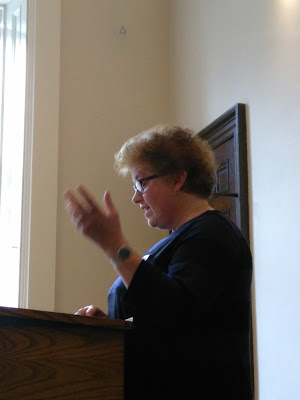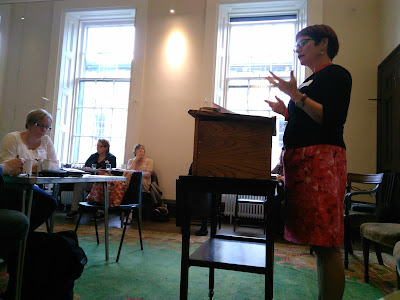The Panicky Pitch
On a sun-drenched afternoon, the members of SCBWI South East Scotland were gathered together. Pitching, a word
some writers associate with panic and sweaty palms, was on our minds.
Safe in the hands of Lindsey Fraser, co-founder of Scottish literary agency, Fraser Ross Associates and Jennifer
Laughran, literary agent from US-based Andrea Brown Literary Agency, we stepped into the world of How To Pitch
Without Panicking.
Jennifer Laughran spoke candidly about her life as an agent. Her sound advice about selecting an agent and what to look for, had us all scribbling in our notebooks as she took us through the process.
To pitch a story, you need to know what kind of story it is, so where would you see your book on the shelves? What
makes a good story? And will it make an agent cry AND laugh?
To find this out:
But do you need an agent to pitch this story to a publisher? Not everyone has an agent, it's a personal choice, but are you industry-aware enough to go it alone?
What will an agent do for you?
To attract an agent you’ll need a Query letter, so what should this be like?
1. Introduction – genre/category/complete word count
2. Pitch – should consist of:
They don't need to know the whole story, make the agent sit up and take notice.
You want them to be saying "and then what happened?"
3. Small biography of you and your writing
An agent is looking for an emotional reaction to you story. Your unique voice is the most important thing you have. Jennifer then noted that most of her clients were from the slushpile: You don't need to live in NY to get a NY agent.
When you do decide which agent to approach:
Her advice on thinking about the pitch:
So, before you press send:
Should I submit more than one MS at a time?
JL: No – one at a time but mention the others you have written.
LF: No
Do you accept a series from first time writers?
JL: Solid, perfect stand alone are best. Will consider companion books with same character
LF: Yes – but judgement based on idea. Prefer stand alone
Would you mention that your work had been professionally edited?
LF: would rather not know and just go by the submission level
Would you want to know if there was 'more of the same'?
LF: Publishers are quite keen on this – an agent will help you with this though
JL: More of the same is good but you need to be a bit diverse too
Is an e-mail the same as a covering letter?
LF: Yes JL: Query is the letter, add in submission below. I don't open attachments.
For the nitty-gritty technical details, do you adhere to UK Format v US Format for page size etc?
Both: don't over-think it. They’re near enough the same. If an agent asks for a one-page synopsis, for examples, use common sense unless they give you specific guidance. It’s usually double spaced unless they say otherwise.
Unconventional Plot Structure – should this be detailed in the query letter?
LF: Maybe a little but don't make excuses for the book.
JL: Yes
Should you mention the themes in the pitch?
Both: In a short verbal pitch, say what the narrative of the story is about, don’t labour the underlying themes. You’ll probably be able to explore them in follow up questions. When you’re describing your book you usually want to let the the reader draw their own conclusions.
Different genres/diverse writing skills, are these essential?
Both: Just write well!
Can you chase a submission query after a while?
Both: Yes, if they have declared interest in the first submission. [N.b. some agencies will now say that if you’ve not heard after a certain period, to assume it’s a no].
Self published before having an agent – are you interested in re-publishing?
Both: Well done! But not interested in that book. What else have you written?
Next, Louise Kelly, who is a psychology lecturer as well as one of the SE Scotland network co-ordinators enlightened us with a biological trail of what happens to our bodies when we pitch.
If someone asks: ‘So, what's your book about?’ How do you answer that question without freaking out?
You get an adrenaline rush in this kind of stressful situation:
The ultimate way to ensure you have remembered everything in your pitch is to use The 5 finger pitch technique. Raise
your hand and count off the following:
Good luck!
Bio: Sarah Broadley mainly writes rhyming picture book stories for younger children but regularly dips her toes into the waters of other genres if the tea is hot enough and she's had enough sleep. Sarah has been a member of the Society of Children's Book Writers and Illustrators (SCBWI) since July 2013, and will be one of the new Network Organisers in South East Scotland from November 1 st 2016. www.greatbigjar.com @sarahpbroadley
Jennifer Laughran spoke candidly about her life as an agent. Her sound advice about selecting an agent and what to look for, had us all scribbling in our notebooks as she took us through the process.
 |
| Jennifer Laughran holds the attention of the room. |
To find this out:
- Go to the library and search through the shelves for the same category/genre stories you are writing
- Who is publishing what?
- Which imprints out there match your premise and age-group?
But do you need an agent to pitch this story to a publisher? Not everyone has an agent, it's a personal choice, but are you industry-aware enough to go it alone?
What will an agent do for you?
- They will champion your work
- Be your advocate when 'tricky' negotiations are required
- Be the bad cop to the Editor on your behalf
- They’ll help protect your rights...
To attract an agent you’ll need a Query letter, so what should this be like?
- First, remember this is a business letter and treat it as such.
- ALWAYS check the web site for submission guidelines and follow them to the letter.
- Agents have specific requirements in terms of whether you include attachments or not, different font/size/document requests etc, but follow these closely as they’ll have asked for them for a reason.
- Make your submission as good as it can be.
- The literary world is a small place – your submission will follow you about.
1. Introduction – genre/category/complete word count
2. Pitch – should consist of:
- Main character(s)
- What do they want to achieve?
- What's stopping them?
- Problem
- Choice they need to make
- Problem gets worse
They don't need to know the whole story, make the agent sit up and take notice.
You want them to be saying "and then what happened?"
3. Small biography of you and your writing
Remember: Pitch – important plot points v Synopsis – whole storyYou’ll also need to be able to give a verbal pitch of your story and this needs to be adapted to your audience. If you’re pitching a book like Libba Bray’s A Great and Terrible Beauty, for example, think of the people you are pitching to: for example-
- Librarian – this is a book set in Victorian London, mulit-cultural, curriculum ties etc
- Parent – five very different girls who come together to make magic.
- Child – a magical story of romance, love and sorcery.
- Try not to pitch as if you have learned it off by heart, a monotone voice can be very off-putting. They will lose interest if you sound bored.
- Do it with excitement and vigour. You are the only one that can spread the joy of your book. There are many ways to get published but if you want to capture the interest of a favourite agent or publisher then practice your pitch as much as you can.
“Every book has its own path, you need to decide which route you're going to take.”A great example of a short pitch: Time Travelling Golden Retriever! Four simple words that have you intrigued ( Ranger In Time by Kate Messner).
An agent is looking for an emotional reaction to you story. Your unique voice is the most important thing you have. Jennifer then noted that most of her clients were from the slushpile: You don't need to live in NY to get a NY agent.
When you do decide which agent to approach:
- Check where their clients' books have been sold throughout the world.
- Go the library – can you easily get a copy of their books?
- Finally, remember, being published isn’t a 'get rich quick scheme' – you have to write because you can't do anything else.
 |
| Lindsey Fraser gives us insight into pitching |
- Stop panicking
- Take your time – if your pitch is successful you'll never have that time to write again
- Make the most of the time you have
“Publishing is an inexact science, marketing is hugely important”
- Sound confident, look confident, appear confident
- There are around 10,000 trade books are published each year, so know why yours is special.
- Whey you’re looking for competitor titles, be aware that on-line booksellers can manipulate the public – recommendations are from what they sell best, rather than looking at everything that's out there
- The on-line world is not the whole truth – take it with a pinch of salt
Mantra of the Day is – you’re aiming for “the dispatch of a product that won't come back to a customer who will”
- Do your research: What books are your local supermarkets stocking? They are harsh critics and becoming increasingly important from a marketing perspective
“Every child will be a reader regardless of what reading age”Your pitch is key throughout the process –Will the agent believe in your story? What will the marketing department think of it?
So, before you press send:
- Have you done your research?
- Have you been to on-line forums for advice and information?
- Are you confident enough to approach them?
- Do you understand the market you are getting into?
- Spell the agents name correctly
- Dear Sirs? No. Especially if the agency is all female!
- Be confident and forthright
- Understand where you see your book in the market place
- Take yourself seriously
- Make your submission as good as it can be before you send it.
- Be nice – (Fraser Ross Associates gets 350 submissions every month) so be patient.
- Be thorough and make your submission stand out: it needs to be well written with an enticing story line.
Should I submit more than one MS at a time?
JL: No – one at a time but mention the others you have written.
LF: No
Do you accept a series from first time writers?
JL: Solid, perfect stand alone are best. Will consider companion books with same character
LF: Yes – but judgement based on idea. Prefer stand alone
Would you mention that your work had been professionally edited?
LF: would rather not know and just go by the submission level
Would you want to know if there was 'more of the same'?
LF: Publishers are quite keen on this – an agent will help you with this though
JL: More of the same is good but you need to be a bit diverse too
Is an e-mail the same as a covering letter?
LF: Yes JL: Query is the letter, add in submission below. I don't open attachments.
For the nitty-gritty technical details, do you adhere to UK Format v US Format for page size etc?
Both: don't over-think it. They’re near enough the same. If an agent asks for a one-page synopsis, for examples, use common sense unless they give you specific guidance. It’s usually double spaced unless they say otherwise.
Unconventional Plot Structure – should this be detailed in the query letter?
LF: Maybe a little but don't make excuses for the book.
JL: Yes
Should you mention the themes in the pitch?
Both: In a short verbal pitch, say what the narrative of the story is about, don’t labour the underlying themes. You’ll probably be able to explore them in follow up questions. When you’re describing your book you usually want to let the the reader draw their own conclusions.
Different genres/diverse writing skills, are these essential?
Both: Just write well!
Can you chase a submission query after a while?
Both: Yes, if they have declared interest in the first submission. [N.b. some agencies will now say that if you’ve not heard after a certain period, to assume it’s a no].
Self published before having an agent – are you interested in re-publishing?
Both: Well done! But not interested in that book. What else have you written?
Next, Louise Kelly, who is a psychology lecturer as well as one of the SE Scotland network co-ordinators enlightened us with a biological trail of what happens to our bodies when we pitch.
If someone asks: ‘So, what's your book about?’ How do you answer that question without freaking out?
You get an adrenaline rush in this kind of stressful situation:
- Heart beats faster
- Sweaty palms
- Control of speech
- Dry mouth/throat closing
- Stop listening
 |
| Louise Kelly using her 5 fingers to explain the 5 Finger Pitch technique |
- What’s the genre/age band?
- Who’s the main character(s)
- What's the character's main goal?
- Which obstacle do they need to overcome to achieve that goal?
- USP – what makes your important story or memorable?
Good luck!
Bio: Sarah Broadley mainly writes rhyming picture book stories for younger children but regularly dips her toes into the waters of other genres if the tea is hot enough and she's had enough sleep. Sarah has been a member of the Society of Children's Book Writers and Illustrators (SCBWI) since July 2013, and will be one of the new Network Organisers in South East Scotland from November 1 st 2016. www.greatbigjar.com @sarahpbroadley












No comments:
We love comments and really appreciate the time it takes to leave one.
Interesting and pithy reactions to a post are brilliant but we also LOVE it when people just say they've read and enjoyed.
We've made it easy to comment by losing the 'are you human?' test, which means we get a lot of spam. Fortunately, Blogger recognises these, so most, if not all, anonymous comments are deleted without reading.